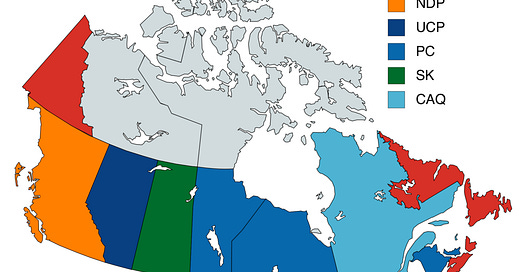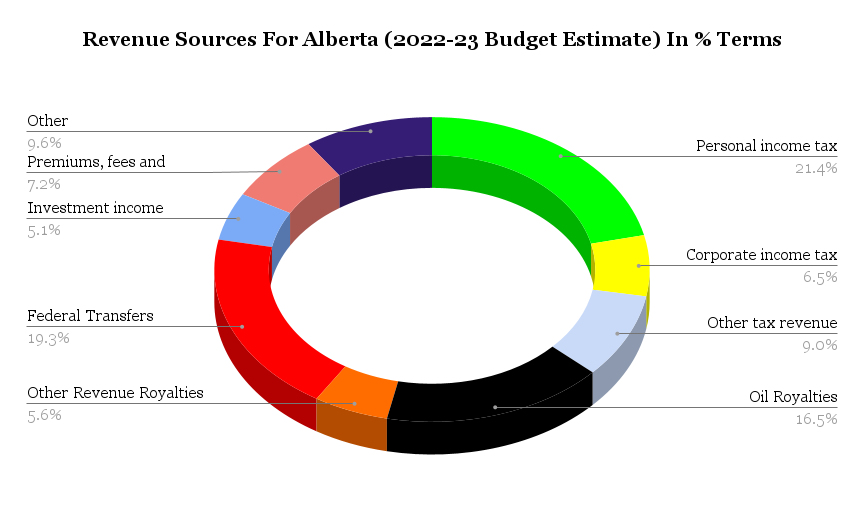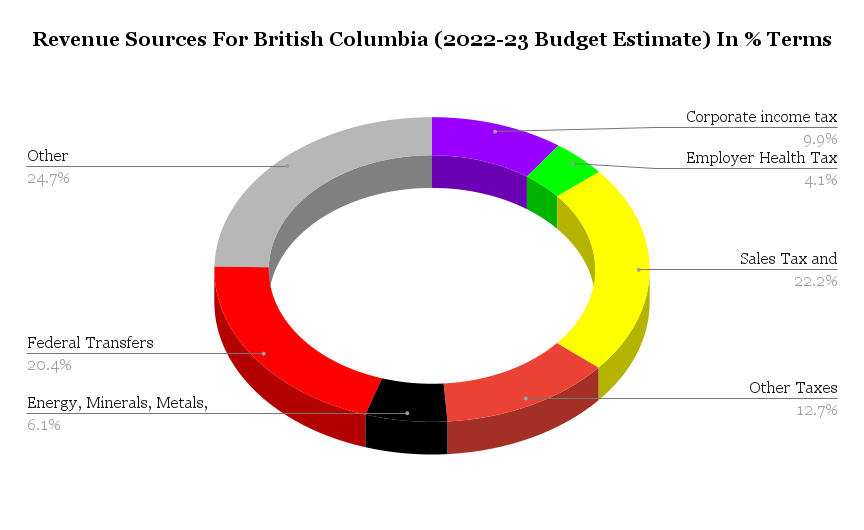Federalism Elsewhere: Canada's "Nations Within A Nation"
Alberta has enacted a Sovereignty Act over the hostility and neglect of the Canadian Federal Government. It shows that the fundamental tensions of federalism are the same everywhere- Canada or India.
Context: Canada’s most prosperous province, Alberta is looking to assert its sovereignty through a legislation which in essence attempts to curtail the role of the Canadian Federal Government. It has been criticised for being possibly unconstitutional and excessive delegation of authority to the Provincial Cabinet. The move by the Canadian Province has been motivated by the supposed hostility of the Federal Government to its economic development, which is dependent on its hydrocarbon industry.

There has been a lot of heated debate in recent years about federalism and the role of states in India’s constitutional setup. Questions over disbursement of dues under the GST regime, or the move to create the co-operative ministry has attracted criticism from the opposition. For a while there was an emphasis on India being a “Union of States”. In many cases, comparisons are made by many to the United States, which is more “federal” compared to the “quasi-federal” nature of the Indian Union.
In this context, Canada’s federal structure is an interesting case study, as it is neither as decentralised as the US nor as centralised as India.1 The recent developments in Canada are even more interesting from an Indian perspective, and one that may merit keen attention.
Alberta, the richest province in Canada has recently passed a legislation to assert its “sovereignty”. The rather amusingly titled “Alberta Sovereignty within a United Canada Act” seems to be more of a political statement than an undermining of the Canadian Constitution. The legislation in essence allows the Alberta Provincial Government to take action or direct municipal/local governments to take action if the Alberta Legislature deems that any federal initiative impugns on the provincial authority or the rights of Albertans. There is a great degree of debate about the constitutionality of this legislation.2
Not The Only Assertion Of Provincial Authority
Alberta’s move to assert its provincial authority is not unique, as Saskatchewan, a similar, but much less populated Canadian province, also seeks to assert its rights through a “The Saskatchewan First Act” which asserts the provinces rights to use its natural resources. However, this is rather redundant in the Canadian context as the Constitution already provides Canadian provinces this exclusive right.3 The Saskatchewan Act therefore seems utterly needless, whereas the Albertan legislation is likely to have at least contexts in which it may be useful.
These legislations of Alberta and Saskatchewan Provincial Governments are motivated by the commonality of political opposition and rejection of the climate change agenda of the Federal Government. Both Alberta and Saskatchewan have significant natural resources4, whose utilisation has been constrained. The exploitation of these resources has led both Alberta and Saskatchewan to have the highest GDP on a per capita basis among the Canadian provinces, as shown below.
The relative prosperity of these two provinces can be further accentuated when taking into account the provincial budgets. The skewed fiscal structure of Canada is a crucial factor in the dissent of Alberta and Saskatchewan that cannot be ignored.
Alberta relies on Oil Royalties for about 1/6th of its revenue, as shown below:
More importantly, the exploitation of natural resources overall contributes more to the income of the provincial government than federal transfers. Combine this with the economic activity generated by the Hydrocarbon industry in tax revenue, which is *the* mover and shaker in Alberta. Alberta is at a unique position as it prides itself on not having any sales tax, rather utilising the Oil Royalties it receives as a fiscal crutch.
The lack of a sales tax has been described as "Alberta's tax advantage". While a significant portion of other Canadian provinces rely on Sales Tax (as illustrated gleefully in the Fiscal Plan document of the Albertan Government), Alberta has not yet had to resort to the same. This is important in the context of Alberta being a net contributor to the Canadian Federal Government Revenues, boosted by the hydrocarbon industry. This is another cause for resentment among Albertans. They feel that they have an outsized contribution to Canada’s revenue, a proposition that is not entirely without merit.5 The argument on states being a “net contributor” to the nation is a talking point among certain Indians as well, as the keen eyed among you would have noticed.
Compare the revenues of Alberta’s with that of British Columbia that has a similar population. Not only does British Columbia run a significant deficit, it also relies on an Employer Healthcare Tax and Sales Tax that contributes more than a fourth of the state’s revenues.
Saskatchewan similar to Alberta relies places significant reliance on revenue from natural resources:
Though Saskatchewan places significant reliance on Sales and Fuel Tax, its deficit and Net Debt to GDP ratio are significantly better.
Clearly Alberta is just richer, and not just in the sense of GDP per capita, but its debt, and deficit indicate a more abiding fiscal capacity. The skewed fiscal structure of Canada is a crucial factor that cannot be ignored.
Political & Federal Asymmetry: Heightening Stress
There is significant asymmetry in the political structure in Canada because of the special status that has been afforded to Quebec. Quebec is culturally and socially dominated by French Canadians, and has been afforded a special place within the Canadian Federal System.6 Quebec has been politically treated as a separate entity to itself, as recognised through the "Nations within a nation" conception.7 The attempts to accommodate the Quebecois are viewed by some Canadians as excessive and violating the principle of equality. The outsized influence of French language in the federal administration and the education system are also points of resentment.
The accommodations made to Quebec and French Canadians in Canada is no joke. The French language is promoted on par with English, Quebec has received significant payments as part of an “equalization programme”, the province has its own income tax system, and much, much more.
It is also important to note that the fractional nature of Canadian politics is of relevance here. Canada’s political parties do not function as unified pan-federal entities. Instead, provincial government’s function and ruled by parties that do not directly correlate to Federal politics. Alberta is ruled by the United Conservative Party, which is aligned broadly speaking to the federal opposition but not directly linked. The disconnect between provincial and federal party systems has partly led to current disaffection.
These structural issues in Federalism and political culture are not helped by persistent conflicts between Alberta and Quebec over the Quebec Government’s opposition to oil pipelines. The failure of the Keystone XL pipeline due to protests in the United States is also viewed by Albertans as a failure of the Trudeau led Federal Government. Long story short; Albertans are artificially constrained in the exploitation of their own natural resources because of Canadian politics; this is driving up the resentment that is manifesting in actions such as this Sovereignty Act. Similar is the case for Saskatchewan.
Polls suggest that those most resentful of Quebec’s place in the Canadian Federation are (surprise, surprise) Alberta and Saskatchewan residents. A clear dynamic can be understood from this - that this is not derived from merely financial consideration but there are deeper fault lines at play here.
The Indian Context: What Can We Learn?
The Canadian Federation was an important point of reference when the Constitution of The Republic of India was being drafted. Dr. B.N. Rau, the Constitutional Adviser to the Constituent Assembly visited Canada (along with the US, UK and Ireland) to collect inputs from eminent statesmen and personalities regarding the draft he had prepared.8 Dr. B.R. Ambedkar too famously compared the nature of federalism of India and Canada among other states to emphasise the limited nature of the federal structure India had adopted.
Unlike Canada or the United States, India’s history does not begin with colonisation - while we till this date remain scarred by it. The framers of the Indian Constitution prized the political unity of the Indian Republic over all else, as can be evidenced from the discourse regarding federalism and the role of the Governor. The federal model of the Indian Union is limited, but the political importance of State Governments cannot be ignored.
Alberta’s experience however does not hold a lot of lessons for the Indian observer - if anything, it is about the possible effects of constraining development of states.9 Arguably, no state has been treated as systematically ignored as the “prairie provinces” of Alberta and Saskatchewan. The North Eastern States of India can ideally make the case for this but there have been significant accommodations made by the Union for them at no cost to other states. The causes of friction between the states and the Centre in India have to do more generally with “special status”, i.e.; financial support or tax devolution issues.
While there has been significant movement on inter-state boundary disputes or inter-state water disputes, they have in general been able to be resolved through dialogue or by judicial decision. While issues have been racked up time and time again for political benefit, the sort of economic constraints that Canada’s Alberta faces does not exist for any Indian State. Moreover, the sort of federal asymmetry that exists with respect to Quebec does not exist in India. The only comparable metric is the special status of Jammu & Kashmir, which has been removed. But its special status in the Indian Union was not consequential for other states.
While some political actors in Tamil Nadu have tried to project tax devolutions by the Centre as being unfair, even going by their numbers it is not as skewed as Canada’s tax devolution.
Can an Indian State enact a Sovereignty Legislation?
A legislation similar to the one Alberta enacted is possible for an Indian State, but rather unlikely because of the dependency of the Indian States on Central Government’s devolution. Many Central Government schemes and programmes have been used effectively by opposition ruled states as sops to their own advantage. In such a context, there is limited utility in trying to assert one’s legislative competency or “sovereignty” as the case maybe.
States would more likely pass resolutions - such as during the CAA-NRC protests or farm laws protests than pass legislation like Alberta. States in India do not face the sort of step motherly treatment that Alberta has received in Canada. Political compulsions under a dominant party system means that the interests of the Union Government align more often than not with States. The fractional nature of politics in Canada is partly responsible in this regard, as noted earlier.
The real lesson for India is in the need for both political and fiscal symmetry in the federal structure. Reforms such as GST help in this regard by introducing a uniform tax structure for the provinces, while accommodating the states through the GST Council. Regular meetings of the Zonal Council of States will also facilitate problem solving measures, which are already in place. The well-rounded development of all states and support from the Centre is crucial - significant economic asymmetry and partisan behaviour by federal governments is crucial. The Aspirational Districts Programme and the Backward Regions Grant Fund are important in this regard.
All of this is not to suggest that Alberta or Saskatchewan is breaking up Canada or that the degree of their issues is significantly higher than tensions in India. However, lessons can still be learnt and understood.
Special thanks to Aishwarya Ajayan for her inputs and edits.
While Douglas Verney argues in his paper Federative Systems and Federations: The United States, Canada and India that the federal systems of Canada and India are more alike, the degree of powers conferred upon the Indian Union Government is substantially higher. Further, historically it should be noted that Canada was formed through the amalgamation of various separate colonies and territories and some amount of latitude conferred on their admission into Canada. The framers of the Indian Constitution explicitly rejected the notion that the Republic has not been formed as a result of an agreement between states and the creation of states are only for the “convenience of administration” (B.R. Ambedkar, Constituent Assembly Debates, 4 Nov., 1948, Volume 7, 48(248)).
The Legislation has already been challenged by a ‘First Nation’ (Indigenous Group recognised by Canada through treaties). and many argue that the bill is unconstitutional at worst, and dangerous at best. It seems broadly to me, a complete novice to Canadian politics, that the commentary is motivated on partisan lines. This especially true after the most egregious provisions of the legislation has been removed. Additional Links: The likely constitutional fly in Alberta's Sovereignty Act ointment, The Alberta Sovereignty Act appears to be constitutional.
Refer Section 92A of the Canadian Constitution.
Saskatchewan has significant reserves of potash, which is used to make potassium, as well as uranium also significant hydrocarbon deposits.
Polling in Canada suggests that the majority across all provinces agree that those in the western provinces (Alberta, Saskatchewan and British Columbia) contribute more than their fair share. Furthermore, the support of the federal government to the mile high debt Quebec and Ontario run is financed by Albertan money (from their perspective) resulting in abiding resentment.
This has to do with the history of the French North American Colony that became Canada. It has been motivated by an attempt to mitigate the separatist sentiment and political machinations.
Recognised famously in a 2006 resolution under Prime Minister Stephen Harper.
Justice Thorsen, who was the President of the Exchequer Court (the then highest court in Canada) suggested that the matters of relation between the States and Centre not be finalised; especially in relation to taxation. Canada was also many a time point a reference for many members of the Constituent Assembly regarding federalism.
The relative prosperity of Punjab compared to other states have been speculated as one of the reasons for the rise of separatism in the 70s and 80s.
Further Reading
Intergovernmental immigration agreements and public accountability
Does Saskatchewan need to be a “nation within a nation” to get more powers?
Standing up to Ottawa: Western alienation shifts into Prairie constitutional challenges
Sask. plans to create its own revenue agency, take more control over tax collection
Peter Zeihan says Alberta would be better off as 51st U.S. state









